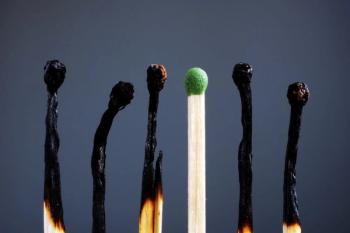
- Vol 39, Issue 9
8 Tips for Psychiatrists to Prevent Burnout
What can we do to improve self-compassion and empathy as mental and behavioral health providers?
In 2018, the American Psychiatric Association found that
It is important to note that the term burnout in itself can be polarizing and create stigma. It can place blame on the individual and does not take into account systemic or structural barriers that lead to untoward distress. At its core,
So, what can we do to improve self-compassion and empathy as mental and behavioral health providers? My answer: We cannot forget to help ourselves before we can possibly help others. What follows are 8 tips.
1) Identify the problem. Though seemingly obvious, it is not. Cardinal signs of waning compassion and empathy include emotional exhaustion, depersonalization, and a decreased sense of personal accomplishment in work or in life. In the best interests of our patients, we need to identify it in ourselves and among our peers. There are self-assessments, including the Maslach Burnout Inventory, that can help.
2) Know you are not alone. We all are part of the human condition. Psychiatrists are not immune to what our patients and society are going through. Moreover, you are not the only psychiatrist or health professional suffering. Acknowledge it; do not stuff it down.
3) Stay connected. On personal and professional levels, there is a growing and persistent need to tackle loneliness and isolation among our family, friends, patients, and peers. The loneliness epidemic predates, but has been exacerbated by, the global COVID-19 pandemic. The surgeon general of the United States, Vivek Murthy, MD, MBA, has emphasized the importance of connection in our lives. Make time to reach out to colleagues, family, and friends.3
4) Practice self-care. Although difficult in times of stress and overwhelming schedules, proper sleep, diet, and exercise are paramount. At the same time, be kind and do not place more stress and blame on yourself if you are unable to accomplish these tasks. Remember, starting small can make a big difference. Sometimes it can be as simple as taking a few minutes to garden, take a walk in nature, or commit to less screen time at night to get started in a positive direction.
5) Reduce or avoid substances of abuse. We know all too well the impact exogenous neurochemical depressants and stimulants can have on our patients. We are no exception. On the contrary, physicians are at heightened risk. If you or any of your colleagues need help, please seek it. There are anonymous resources through the Federation of State Physician Health Programs.4
6) Prioritize teamwork. Studies have shown that being part of a treating team not only improves patient outcomes, but also fosters a sense of well-being for clinicians. If you are not part of a group practice or academic center, there are opportunities to collaborate and share knowledge. If you are in a remote, individual practice environment, companies like SonderMind can help facilitate virtual, supportive peer communities.
7) Stay curious. Continuously learn and grow not just in your professional field to better serve your patients, but also for yourself. Use self-inquiry, and question how certain situations or circumstances impact how we feel and react.
8) Remember your purpose. We are drawn to our profession to help others. We are mission-driven individuals, yet for many, psychiatry is not the only endeavor that gives us joy and purpose. Find creative or philanthropic outlets that fill your cup. Whether you want to call it altruism, religion, or spiritualism, studies have shown a sense of higher purpose promotes well-being.
Lastly, please remember, you are not the problem. However, through caring for yourself and staying connected to others, you can be the solution.
Dr Newton is the chief medical officer at SonderMind.
References
1. American Psychiatric Association Board of Trustees Ad Hoc Work Group. Psychiatrist well-being and burnout. 2018. Accessed August 1, 2022.
2. Neff K.
3. Murthy VH.
4. About FSPHP. Federation of State Physician Health Programs. Accessed August 1, 2022.
Articles in this issue
over 3 years ago
Burnout and Its Remediesover 3 years ago
The Need for Novel Treatments for Bipolar Depressionover 3 years ago
The Alluring Mistress: Reflections From My Affair With Medicineover 3 years ago
Planning for Your 2022 Taxesover 3 years ago
School Is in Sessionover 3 years ago
"Grappelli’s Smile"over 3 years ago
Headaches: The Common, Challenging Comorbidityover 3 years ago
Using Cognitive Behavioral Therapy to Enhance Well-BeingNewsletter
Receive trusted psychiatric news, expert analysis, and clinical insights — subscribe today to support your practice and your patients.







